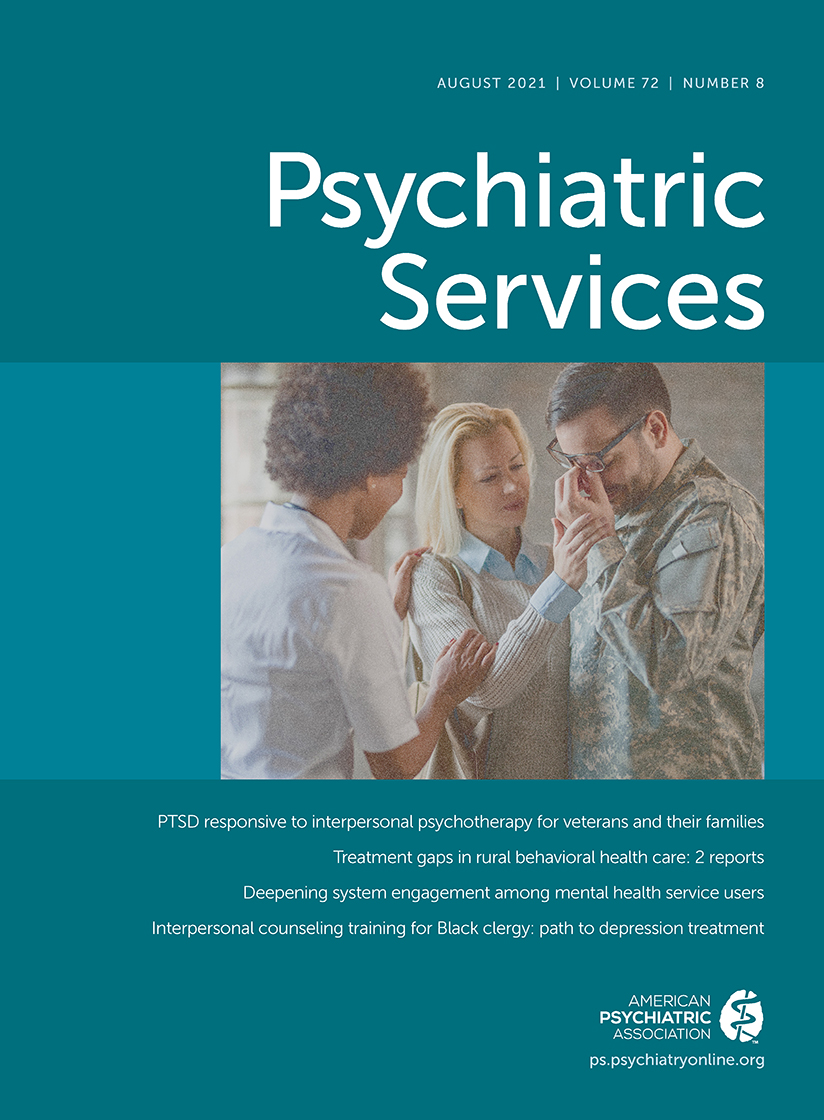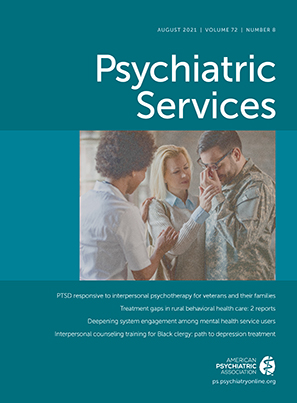The care and management of psychiatric patients who become involved with the criminal justice system cry out for innovative reform. Nearly half a century has passed since the alarms were first sounded regarding the tide of individuals with mental illness flooding jails and prisons (
1–
4). Individuals with serious mental illness continue to be confined in jails and prisons in high numbers. Among male jail detainees, the prevalence of serious mental disorders (bipolar, depressive, and psychotic disorders) is 14.5%; among female detainees the prevalence is higher, at 31% (
5). A large U.S. Bureau of Justice Statistics survey found significant mental illness among 16.2% of state-incarcerated individuals, 7.4% of federally incarcerated individuals, 16.3% of those in jail, and 16.0% of those on probation (
6). These figures suggest that >800,000 individuals with mental illness are under correctional control at any given time: 180,000 state-incarcerated individuals, 8,000 federally incarcerated individuals, 97,000 jail detainees, and 547,000 persons on probation (
7).
In this Open Forum, we propose a new commitment pathway that would remove many offenders with the most serious disorders from the regular criminal justice processes of adjudication, sentencing, and incarceration. Instead, these offenders would be committed to care and treatment in the public mental health system with oversight by the responsible courts.
Implementation of the new pathway would have other positive consequences. At present, U.S. courts are overwhelmed with the task of administering justice to defendants with mental illness. These defendants often require an assessment of competence to stand trial (CST) and hospitalization to restore competence. Our public systems of care are in crisis because they have become increasingly devoted to patients facing criminal charges who require hospitalization and specialized and costly forensic evaluations (
10,
11). State forensic mental health divisions have become unsustainably bloated. In 2014, states spent nearly $9 billion for all inpatient services, of which $4.1 billion was spent for inpatient forensic services, 43.7% of the total (
12). This percentage has steadily grown over the years—from 25.7% in fiscal year 2001 to 36.4% in fiscal year 2008 (
12).
Proposed Commitment Law
We propose a new pathway to civil commitment designed to divert many offenders with serious mental illness from the criminal justice system early in the process, including those now cycling through the criminal justice system under competence assessment and treatment orders. Key elements of this proposal are summarized below. This is a preliminary proposal to stimulate further conversation; it is not meant to be a finished product.
The envisioned form of commitment would be applicable to a subgroup of offenders with serious mental illness whose criminal behavior appears to be sufficiently related to their illness that they are likely to continue to offend in the absence of aggressive treatment interventions and social supports. Whether or not the risks associated with their mental illness independently justify legal intervention, the criminal behavior associated with the illness justifies an intensive array of mandatory interventions designed to stabilize the person’s functioning and prevent deterioration and recidivism.
Compared with the traditional civil commitment model, the new civil commitment pathway would place a stronger emphasis on public safety and prevention of deterioration, with more restrictions, quicker interventions, and a greater emphasis on maintaining outpatient compliance with treatment. However, it would be more therapeutically oriented and less restrictive than typical not-guilty-by-reason-of-insanity (NGRI) systems. For the most part, we anticipate that treatment and services for the target population would be delivered in the community if the individual treated is not in crisis or seriously noncompliant with treatment.
The new commitment pathway prioritizes treatment, discharge planning, and the continuity of care in the community. This pathway will embrace a problem-solving ethos, with a therapeutic emphasis on identifying triggers to problematic community behavior and supplying supports to enable appropriate functioning.
This new pathway would represent a formal diversion from the criminal process, and it would involve expedited termination of criminal proceedings (i.e., it would not constitute a conditional disposition under which the charges could be resurrected on the basis of noncompliance).
The commitment would encompass both inpatient and outpatient treatment options, applied on an individualized basis according to clinical criteria. Outpatient treatment would be similar to mandatory outpatient treatment available in many states currently. In the event of mental health deterioration or reoffending in the community, the individual may undergo a period of inpatient commitment for reassessment and problem-solving discharge planning.
The expectation is that under this new civil pathway, many of the offenders with serious mental illness now in jail would be diverted from the criminal process.
Initiating a commitment.
Like a CST evaluation, a request for an assessment of a detainee’s commitment eligibility may be made by either party (i.e., prosecution or defense) or the court. In addition, a request for a CST evaluation by either party or court will trigger a judicial review of the appropriateness of an assessment for commitment eligibility as an alternative path. However, regardless of how the request for assessment arises, a commitment may not occur unless the prosecution petitions for it. In practice, we expect that in many cases involving less serious offenses, commitment would be a consensual disposition.
The initial psychiatric assessment would include determination of a mental disorder and provide a summary of past problematic behavior. Moreover, the psychiatrist would identify risks for violent or criminal behavior or other factors detrimental to long-term adjustment in the community. These risks and factors would be addressed in treatment planning.
Commitment hearing and criteria.
The commitment would follow current requirements: right to notice, right to counsel, right to a hearing, proof by clear and convincing evidence, and the right to appeal, for example. The predicates for commitment would be a serious mental disorder as defined by state law for traditional civil commitment. Proof would require clear and convincing evidence that the person committed the elements of the charged offense and that the conduct underlying the charged offense was related to a serious mental illness. It would also require clear evidence for a significant likelihood of future offending in the absence of treatment interventions and for a reasonable likelihood, based on psychiatric evidence, that the mental disorder can be effectively treated.
The commitment order would be grounded in a detailed treatment plan, identifying treatment providers, services, and classes of medication needed. These services would include provisions for inpatient and outpatient care as necessary, including residential treatment, assertive community treatment, day treatment, and other needed care services; estimates of the expected length of intensive treatment under the commitment order; and long-term treatment and service needs that are likely required after the commitment order has expired.
The court would be required to monitor the provision of the services as detailed in the plan, to ensure compliance and continuity of court-ordered care. A hearing would be held periodically, but no less than every 6 months, and the care and progress of the committed person would be thoroughly reviewed.
Length of commitment.
Jurisdictions may differ in judgments about how to best balance safety and therapeutic concerns and therefore about the appropriate commitment length. Jurisdictions should base commitment duration on the committed person’s treatment needs as demonstrated by successful transition and stability in the community. It may be necessary for those with complex service needs to be committed to a more extended period of mandatory care.
However, criminal justice factors should play a role in determining the ceiling of the involuntary treatment period. In most circumstances, if the predicate offense for the commitment is a misdemeanor, the commitment period should expire after 1 year. For persons accused of nonviolent felonies, a maximum period of 3 years should be appropriate in most circumstances and should be sufficient to bring prosecutors on board to petition for commitment. For more serious felonies, a ceiling of 5 years may strike an acceptable balance between therapeutic needs and public safety concerns. In any case, the length of commitment should not exceed the period of the maximum sentence the committed person would have received if convicted of the charged criminal behavior. The proposed pathway is not suitable for cases in which the prosecutor is seeking long-term psychiatric confinement, as is common in NGRI commitments. The commitment should terminate whenever the judge determines that the person no longer needs supervision for public safety reasons or no longer needs treatment.
Summary.
The proposed law borrows familiar elements from civil and outpatient commitment models. The adoption of this model does not exclude continued use of other programmatic innovations, such as mental health courts and diversion programs. However, the proposed law differs in important ways from those programs. As a commitment law, it would be applicable statewide. In contrast, traditional informal diversion programs are based on voluntary entry by defendants and are available in relatively few jurisdictions. Because these programs are local innovations, they rely on negotiation on a court-by-court basis, generally involving a strong champion to promote adoption, and require buy-in from multiple agencies and resources from uncertain and transient funding pools.

